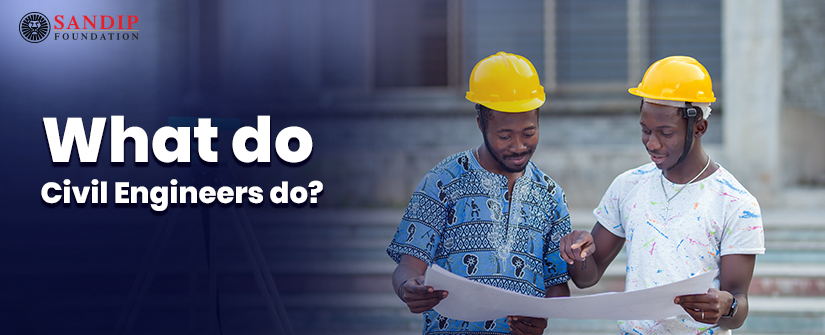Civil engineering is an interesting field with numerous career opportunities. Civil engineers are highly trained and skilled professionals who work in a fast-paced environment. Many top civil engineering colleges in Maharashtra offer undergraduate and postgraduate programs to students interested in becoming civil engineers. You must be wondering about the role of civil engineering in our lives. To understand that, we must first understand what a civil engineer is in order to understand what they do.
An engineer who develops and oversees the development of significant infrastructure projects like roads, bridges, dams, tunnels, buildings, airports, water and sewage systems, and other infrastructure is known as a civil engineer. The most obvious works of civil engineering are those found above buildings and bridges. A civil engineer uses scientific knowledge to enhance the public services and infrastructure that support basic human needs.
What does a Civil Engineer do?
Given that people initially began establishing permanent settlements and designing their environs to meet their needs, civil engineering is one of the earliest fields of engineering, second only to military engineering.
Although populations increased and more people started residing in towns and cities, there is still a need for dependable sources of clean water, a way to dispose of waste, a network of streets and roadways for commerce and trade, and a mechanism for people to defend themselves against hostile neighbours.
The sub fields of civil engineering are:
1) Structural Engineering
An important step in the building process is the structural engineer’s job. Engineers who specialise in structural design work in offices or on building sites. In teams of professionals, skilled, and semi-skilled labourers, structural engineers may also be asked to work long hours, depending on the scope of the project. A solid understanding of physics, proficiency with three-dimensional concepts, and problem-solving creativity are requirements for structural engineers. In structural engineering civil engineers perform the work in the field of design, investigation, communication, management and training departments.
2) Construction Engineering
The task of planning, creating, and developing construction plans and specifications will fall to the construction engineer. Along with reviewing construction plans, he ought to contribute technical knowledge or make adjustments. Top engineering colleges in Nashik offer M.Tech in Construction Management to help students become skilled construction engineers in the field.
3) Earthquake Engineering
Be aware of the potential effects of strong earthquakes on civil infrastructure and metropolitan areas. Design, develop, and maintain structures so they meet expectations and adhere to building codes when exposed to earthquakes. Engineers who study earthquakes are naturally concerned about the vibrations in the Earth’s crust that have the potential to seriously harm the planet’s surface.
4) Transportation Engineering
This profession frequently necessitates expertise in road, rail, or pedestrian transport in addition to a working knowledge of vehicle propulsion and maintenance. Transportation engineers are frequently used by both public and commercial transportation organisations to maintain effectiveness, lower system costs, oversee safety programmes, and perform investigations.
5) Highway Engineering
A highway engineer’s duties include planning and supervising the building of highways, bridges, tunnels, and expansive parking lots. Roadway alignment, traffic light placement, drainage systems, and illumination are their main concerns. Designing plans for brand-new roads or improvements to existing ones is part of a routine workday. By studying present traffic patterns, engineers must also estimate project expenses. The three main areas of highway engineering are planning, research, and building.
6) Railway Engineering
As a rail systems engineer, it is your duty to contribute technical knowledge to projects involving rail engineering for a range of various systems. Transportation engineering has a specialty called railway engineering. The focus of this field is on the planning, building, and operation of trains and rail systems for the movement of people and/or goods.
7) Traffic Engineering
The designs and procedures that enable the safe, effective, and convenient flow of car traffic are developed and managed by traffic engineers in a variety of positions. Transportation engineering as a whole, which includes not only automotive traffic but also pedestrian, airline, boat, and railway travel, includes traffic engineering as one of its subcategories. Projects requiring these various types of transportation, particularly pedestrian movements, are sometimes handled by traffic engineers.
8) Geotechnical Engineering
Geotechnical engineers plan and design the framework for many other construction projects, including embankments, canals, roads, and buildings. The geotechnical engineer deals with geological risks like landslides, soil erosion, and, in some extreme cases, earthquakes in addition to their involvement in building.
9) Hydraulic Engineering
Projects involving the movement and control of fluids are designed by hydraulic engineers, who are qualified engineers. In order to comprehend water systems and create dams, levees, and drainage systems for the local government, these engineers must do numerous researches.
10) Environmental Engineering
Environmental engineers are creative problem-solvers who identify and address environmental problems. Their main responsibilities include gathering and evaluating environmental data, researching how humans affect the environment, and enhancing environmental management.
Conclusion
Civil engineers spend a lot of their time in offices performing intricate calculations and designs. They frequently travel to building sites, mining sites, or other outdoor locations to keep an eye on activities, manage their teams, perform jobs like surveying and analysis, address issues at the location, and work with other specialists on their projects. Some of the best engineering colleges in Maharashtra offer industry-oriented engineering programs to train the next generation of engineers in India. So do some research and pick the college that suits your career goals the best. Good luck!

